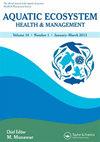全球自然保护和对气候压力的明显无效适应
IF 0.8
4区 环境科学与生态学
Q4 ENVIRONMENTAL SCIENCES
引用次数: 0
摘要
政府间气候变化专门委员会(ipcc)基于几种情景预测了气候变化的影响,并强调了到2100年生物气候压力的潜在区域变化。了解气候变化对生态系统的影响,对自然保育至为重要;河流和沿海地区的生物多样性受到洪水和干旱等天气相关事件导致的温度升高的威胁。本研究评估了气候变化对给定的基于自然的解决方案的绩效的影响,以及自然保护管理计划在考虑气候变化方面的成功(或失败)。为了评估的目的,管理计划是针对联合国可持续发展目标目标进行分析的。分析的案例研究包括分布在欧洲、大洋洲和北美的河流和沿海地区的12个基于自然的解决方案站点。对其可持续发展目标绩效进行定量分析,用于可持续发展目标-可持续指数得分,开源指标数据,并对自然保护管理计划进行定性分析。考虑的可持续发展目标包括:清洁水和卫生设施(6);产业、创新;基础设施(9);可持续城市和社区(11);负责任的消费和生产(12);气候行动(13);水下生命(14);陆地上的生命(15)。利用国际气候变化专门委员会在共享社会经济路径1-2.6和共享社会经济路径5-8.5情景下的预测,获得基于自然的解决方案和自然保护管理计划在气候变化和生物多样性保护的适应轨迹中发挥作用的证据。研究结果强调,大多数自然保护管理计划和它们通常依赖的基于自然的解决方案没有对气候变化给予足够的重视。证据表明,当考虑到共享社会经济路径1-2.6和共享社会经济路径5-8.5情景下的气候变化影响时,所研究的基于自然的解决方案站点无法实现选定的可持续发展目标。通过这一评估,确定河流保护区需要更严格的气候适应战略和自然保护规划,以增强复原力,并有潜力实现所述可持续发展目标。本文章由计算机程序翻译,如有差异,请以英文原文为准。
Global nature conservation and the apparent ineffective adaptation to climate pressures
Abstract The Intergovernmental Panel on Climate Change projects climate change effects based on several scenarios and highlights the potential regional changes of bioclimatic pressures up until 2100. Understanding the effects of climate change on the ecosystems is of utmost importance for nature conservation; biodiversity in riverine and coastal areas is threatened by temperature increase by weather-related events like floods and droughts. This study evaluates the impact of climate change on the performance of a given nature-based solution and nature conservation management plan's success (or failure) to account for climate change. For the purpose of the evaluation, management plans are analysed against the UN Sustainable Development Goals targets. The case studies analysed include twelve nature-based solution sites in riverine and coastal areas, distributed across Europe, Oceania and North America. Their sustainable development goals performance is analysed quantitatively for the Sustainable Development Goals-Sustainable Index Score, open-source indicator data and qualitatively for the nature conservation management plans. Sustainable development goals considered include the following: clean water and sanitation (6); industry, innovation & infrastructure (9); sustainable cities and communities (11); responsible consumption and production (12); climate action (13); life below water (14); life on land (15). The International Panel on Climate Change projections under the Shared Socio-economic Pathways1-2.6 and Shared Socio-economic Pathways5-8.5 scenarios are used to gain evidence of the role nature-based solutions and nature conservation management plans can play in adaptation trajectories for climate change and biodiversity conservation. The results highlight that most nature conservation management plans and the nature-based solution they typically rely upon, do not pay sufficient attention to climate change. The evidence suggests that the studied nature-based solution sites are not on track to achieve selected sustainable development goals when climate change impacts under the Shared Socio-economic Pathways1-2.6 and Shared Socio-economic Pathways5-8.5 scenarios are factored in. Through this evaluation, riverine conservation areas are identified as requiring more rigorous climate adaptation strategies and nature conservation planning to enhance resilience and to have the potential of fulfilling the addressed SDGs.
求助全文
通过发布文献求助,成功后即可免费获取论文全文。
去求助
来源期刊

Aquatic Ecosystem Health & Management
环境科学-海洋与淡水生物学
CiteScore
1.70
自引率
0.00%
发文量
1
审稿时长
18-36 weeks
期刊介绍:
The journal publishes articles on the following themes and topics:
• Original articles focusing on ecosystem-based sciences, ecosystem health and management of marine and aquatic ecosystems
• Reviews, invited perspectives and keynote contributions from conferences
• Special issues on important emerging topics, themes, and ecosystems (climate change, invasive species, HABs, risk assessment, models)
 求助内容:
求助内容: 应助结果提醒方式:
应助结果提醒方式:


